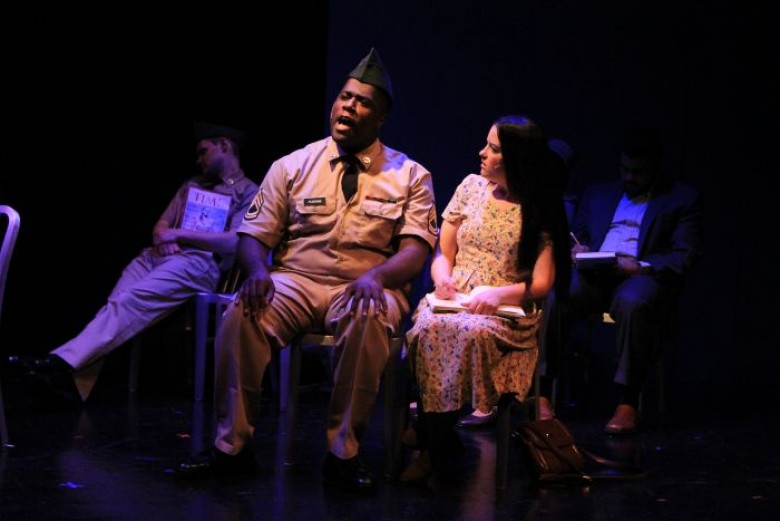Oh, if we could only heal our wounds so that scars, visible and invisible, would not inform how we believe others perceive us, and how we perceive ourselves. Would that not be a blessing to all.
In Violet, now at Musicalfare Theatre, a young woman’s face is badly disfigured by a blade that flew from her father’s axe as he was chopping wood when she was 13. Her mother died many years before the accident, and her father more recently, so Violet lives in isolation in the Blue Ridge Mountains of North Carolina in 1964. She has succumbed to the belief that her disfigurement means that she will never be loved by a man, and will never be accepted by society.
Violet has been mesmerized by a TV preacher and believes that if she travels on the Greyhound bus to Tulsa, Oklahoma and goes to the chapel there where he preaches, he will heal her and give her eyes like Gene Tierney, skin like Rita Hayworth, and cheekbones like Ingrid Bergman. Not a very realistic belief, one might say, but one on which she has pinned her hopes for being seen for who she is beneath the disfigurement, and for finding true love.
While this all may sound rather sad and gloomy, in reality Violet is light-hearted and uplifting at its core, with music that moves between R&B and blues, rousing gospel, and rock 'n'roll. Sweet songs of longing and love are interspersed with foot-stomping rhythms.
Violet meets two soldiers who are traveling together on the bus. Monty is a young, white corporal on the make, and Flick is a more mature, Negro sergeant (remember it is 1964 in the South). Her journey takes on deeper meaning as she vacillates between the two, unsure if she can have more than the fleeting sexual encounter she has experienced in the past. But she is no pushover. She has determination and grit, as when Flick is disrespected at a stopover by the waiter in a diner. Violet intervenes on his behalf, tells Flick not to make a big deal of it, and then challenges the soldiers to a game of poker. While they play, a flashback scene with young Violet and her father takes place, as he teaches her poker as a way of learning math, with the song “Luck of the Draw.” It is a very witty, complex piece that Jeffrey Coyle as the father does expertly, singing and talking while dealing and shuffling cards.
There are several flashback scenes from Violet’s adolescence, along with dream sequences that add back story and depth to the musical, as she and the soldiers travel together and come to know each other, for better and for worse.
Michele Marie Roberts shines as Violet. She embodies the fear, loneliness, strength, longing, and toughness of a young woman who has been badly damaged on the outside, but has maintained her faith on the inside, even if it seems misplaced to others. Her voice is pure and lovely as she moves seamlessly between anger, fear, and longing in one song after another, from the optimistic On My Way, to the melancholy Lay Down Your Head.
The cast is first-rate. Maria Farugia is delightful as Young Violet. She has a sweet voice and playful manner, and is not afraid to show her anger and sadness. Dudney Joseph as Flick has a terrific gospel song, Let It Sing, that he raises to the rafters. He lets us know that he knows how painful it is to be an outsider, but is not going to be brought down by it, that he is a man, not a boy, while at the same time we see that he is shy to approach Violet as a lover. On the other hand, Patrick Cameron as Monty could not be more sure of himself and what he wants. His song, Last Time I Came to Memphis, tells us and Violet in no uncertain terms just what he looks for in a woman – sex, plenty of it, and goodbye in the morning. But, is he really feeling something more for Violet? Hmmm. Jeffrey Coyle as the father not only charms us in the poker scene, but also shows us his sadness and guilt about the accident in flashback and dream sequences. Ben Michael Moran is a hoot as Preacher. He steals every scene he is in. He just is a riot, speaking in tongues, calling on Jeee-zuz, screaming criticism at his gospel singers, and generally chewing up the scenery in his white suit. He personifies every excess of sleazy television preachers. Taylor Carlson, Annette Christian (what a voice!), Matthew Iwanski, Matt Rivera, Ember Tate and Maggie Zindle as the quintessential, stooped and snoopy Old Lady round out the fine cast.
Direction is by Susan Drozd. Her juxtaposition of present and past scenes is very well done. While they take place simultaneously, each is clearly delineated in a way that makes it possible for the audience to “get” each one. The unseen musicians, directed by Theresa Quinn, are excellent. The set design by Chris Schenk works very well for the bus and and various diners, bars, and boarding house. Loved the blinking sign.
While Act Two wrapped things up rather quickly in terms of the relationships between Violet, Flick, and Monty, the musical entertains throughout. Violet displays wounds and scars of many kinds, while also presenting the healing power of love and faith in oneself.

